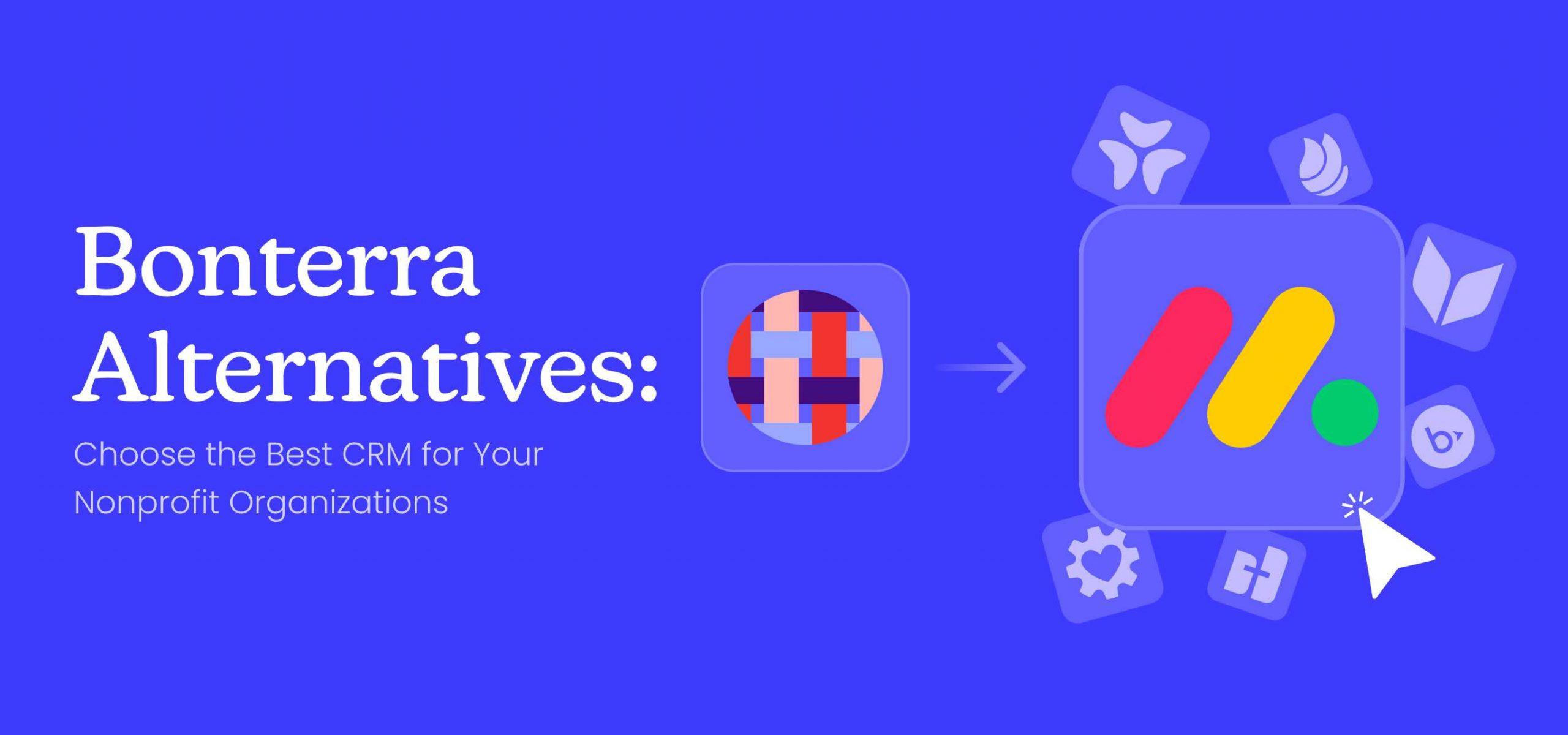
Bonterra Alternatives: Best CRM for Nonprofit Organizations
Bonterra has long been a trusted name in nonprofit fundraising software. However, many users are starting to feel the strain of its complex interface, high costs, and inflexible customization options.
Many nonprofits struggle with Bonterra’s challenging learning process, making onboarding new team members challenging. The high price tag can also burden smaller organizations with tight budgets. Additionally, the software’s limited ability to tailor to specific needs frustrates many users.
Recent surveys show that 68% of nonprofits feel trapped by their current software’s limitations and inability to grow alongside their organization. Whether you’re currently using Bonterra and looking for a change or just beginning your search for the right CRM, we’re here to help.
In this blog, we’ll explore the best Bonterra alternatives, detailing the pros and cons of each option so you can find the perfect fit for your nonprofit. Before exploring alternatives, let us explain nonprofit CRM in simple language.
Ready To Streamline Your Migration From Bonterra to Monday.com?
What is Non-profit CRM?
A nonprofit CRM, or customer relationship management tool, is mainly designed for non-profit organizations to help them record and manage donor information. Think of it as a “donor management system” that does more than just organize donor data.
Such CRM software provides valuable insights and recommendations to increase the chances of future donations. A nonprofit CRM can suggest personalized ways to engage each donor by analyzing donor behaviour, history, and engagement patterns. This could mean identifying the best times to reach out, the most effective communication channels, and crafting tailored messages that resonate with each donor.
With these insights, nonprofits can build stronger, more meaningful relationships with their donors, encouraging them to give repeatedly.
Top 7 Alternatives to Bonterra CRM
1. monday.com
Suitable for: Medium to large nonprofits that need advanced project management capabilities and have the resources to invest in a comprehensive solution.
monday.com is a highly adaptable and user-friendly project management platform, making it an excellent choice for nonprofit organizations. Its intuitive interface allows teams to easily customize workflows, streamline communication, and manage projects with transparency and efficiency.
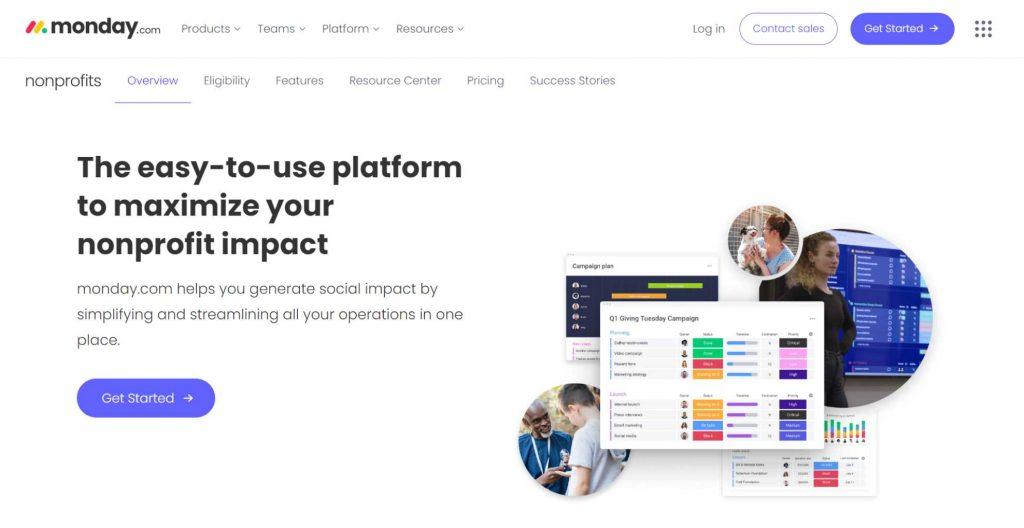
Nonprofit organizations can benefit from customizable workflows that fit their unique needs, whether for donor management or volunteer coordination. The platform’s collaboration tools enhance teamwork through integrated messaging, file sharing, and real-time updates.
Pros of Monday.com
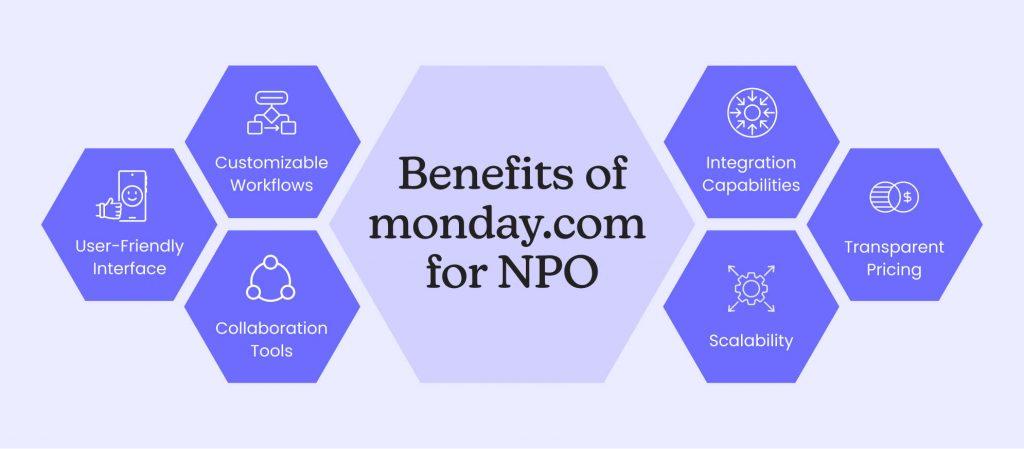
- User-Friendly Interface: monday.com offers an intuitive and visually appealing interface that simplifies navigation and usability for nonprofit teams of all technical abilities. This ease of use enhances productivity and reduces staff members’ learning curve.
- Customizable Workflows: Organizations can tailor workflows within monday.com to align with their specific processes and operational needs. This customization capability allows nonprofits to optimize project management, task assignments, and team collaboration, thereby improving efficiency.
- Collaboration Tools: The platform provides robust features like task assignments, real-time updates, and file sharing. These tools foster seamless teamwork and communication among staff members, volunteers, and stakeholders, enhancing organizational effectiveness.
- Integration Capabilities: monday.com integrates seamlessly with various third-party applications, including popular tools like Slack, Google Drive, and Zoom. This integration capability extends functionality and allows nonprofits to consolidate workflows, streamline operations, and leverage existing software investments.
- Scalability: As nonprofits grow and their needs evolve, monday.com scales effectively to accommodate increased project complexity and team size. This scalability ensures that organizations can continue to use the platform as their operations expand without encountering significant limitations.
- Transparent Pricing: monday.com offers transparent pricing plans with clear features and pricing tiers, making it easier for nonprofits to choose a plan that aligns with their budget and operational requirements. This transparency helps organizations manage costs effectively and plan for future growth.
Cons of Monday.com
- Difficult Onboarding: Some users may find the initial setup and customization process complex, especially those who are not tech-savvy or have limited experience with similar software.
- Board Setting: Customizing board settings for different user demographics is limited. Some users have expressed frustration over the inability to delete certain board settings irrelevant to their team’s needs.
Pricing for NPOs:
monday.com provides special pricing for nonprofits, often offering discounts or customized plans to fit different budgets. Detailed pricing is typically available upon request from their sales team.
Pricing Plans:
- Free Plan: 2 seats for unlimited time
- Basic: $9 per seat/month (billed annually)
- Standard Plan: $12 per seat/month (billed annually)
- Pro Plan: $19 per seat/month (billed annually)
- Enterprise: Contact Sales
Note: monday.com offers a 33% special discount for nonprofit organizations.
2. Bloomerang
Suitable for: Small to medium-sized nonprofits looking to enhance donor relations and fundraising efficiency.
Bloomerang is an exceptional online fundraising platform tailored specifically for nonprofit organizations. Its user-friendly interface and comprehensive features streamline donor management and engagement.
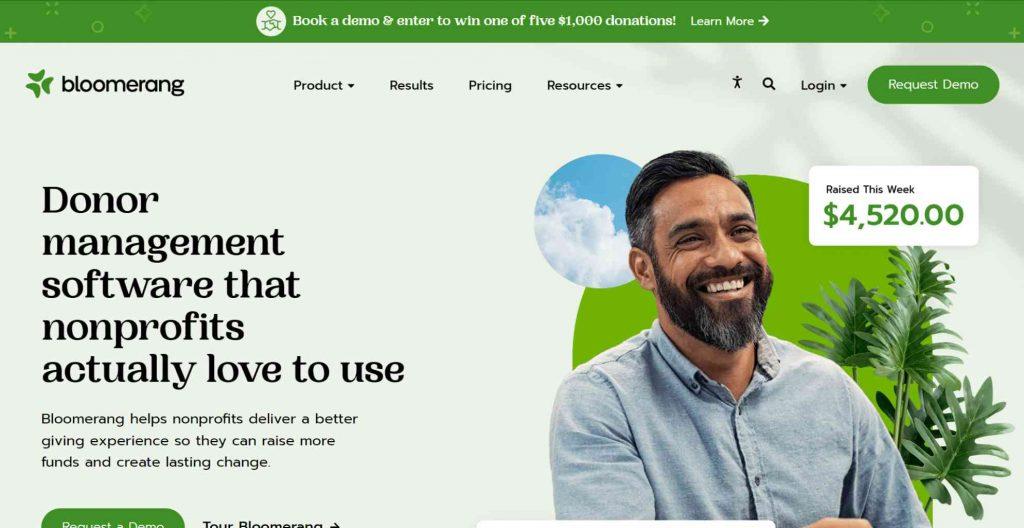
Bloomerang’s emphasis on donor retention, easy-to-use dashboard, and excellent customer support make it a strong fundraising alternative for nonprofits seeking to optimize their strategies. Its affordability and scalability ensure that organizations of all sizes can benefit from its capabilities, making it a versatile solution for the nonprofit sector.
Pros of Bloomerang
- Donor Management: Bloomerang excels in managing donors by offering comprehensive tools that allow nonprofits to track donor interactions effectively. This includes recording donations, communication history, event attendance, and other relevant interactions. By centralizing donor data, Bloomerang enables organizations to build detailed donor profiles and personalize outreach efforts.
- User-Friendly: One of Bloomerang’s standout features is its user-friendly interface, which is designed to be intuitive and accessible for staff members with varying levels of technical expertise. The platform’s layout and navigation are simple, making it easy for users to utilize its functionalities without extensive training.
- Reporting: Bloomerang offers robust reporting features that empower nonprofits to analyze their performance and make data-driven decisions. The platform provides various pre-built reports and customizable dashboards that present key metrics such as donation trends, campaign effectiveness, donor demographics, and engagement levels.
Cons of Bloomerang
- Customization: Compared to other CRMs, Bloomerang offers fewer customization options for workflows and dashboards.
- Integration Limitations: Integration with other software solutions is less extensive than some might need.
Pricing for NPOs:
Bloomerang offers a tiered pricing structure based on the number of records managed. Nonprofits can benefit from discounted rates and flexible payment plans.
Pricing Plans:
- Fundraising: $40/month
- Volunteer Management: $119/month
- Membership Management: $25/month
- Bloomerang CRM: $125/month
3. Keela
Suitable for: Small to medium-sized nonprofits that need a cost-effective, integrated CRM solution with robust analytics capabilities.
Keela is an innovative CRM designed to simplify donor management for nonprofit organizations, making it a strong alternative to Bonterra. This platform offers tools that streamline fundraising, donor engagement, and data analysis.
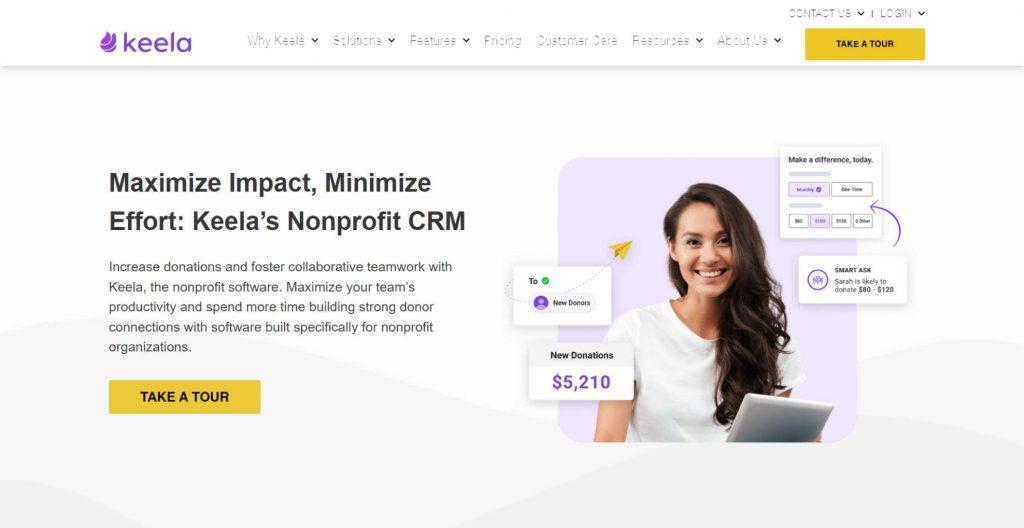
Keela’s intelligent workflows and automation features help nonprofits save time and resources, allowing them to focus more on their mission. With Keela, organizations can manage donor relationships effectively, track donations, and generate insightful reports to enhance fundraising strategies.
Pros of Keela:
- Comprehensive CRM: Keela provides a powerful CRM system tailored for nonprofits, including direct giving, email marketing, and project management tools.
- AI-Powered Insights: Advanced analytics and AI-driven insights help organizations optimize their operations and fundraising strategies.
- Affordability: Keela is priced competitively, making it accessible for smaller nonprofits.
Cons of Keela:
- Limited Customization: While feature-rich, Keela offers limited customization options compared to more complex platforms.
- Support Response Time: Some users report slower response times from customer support.
Pricing for NPOs
Keela offers various pricing plans based on the number of contacts and users. Special discounts are available for nonprofits, ensuring affordability.
Pricing Plans:
- 1000 Users: $160/month for only automation
- 2000 Users: $225/month
4. Virtuous
Suitable for: Medium to large nonprofits focused on building strong, personalized donor relationships and leveraging automation for efficiency.
Virtuous CRM is designed to help nonprofits connect with supporters through tailored communication and targeted campaigns. It integrates advanced tools for donor management, marketing automation, and peer-to-peer fundraising, providing insightful analytics and reporting features.
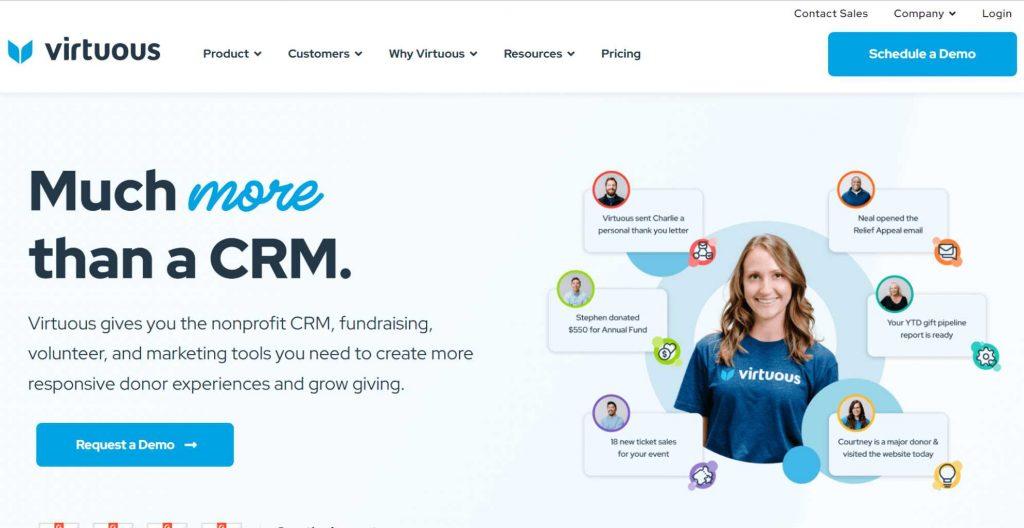
These capabilities allow nonprofits to measure campaign success and refine strategies, enhancing donor engagement, streamlining operations, and driving significant growth in fundraising initiatives.
Pros of Virtuous CRM
- Donor-Centric CRM: Virtuous focuses on donor-centric relationship management, offering personalized communication and engagement tools. This approach helps organizations create more meaningful interactions by treating donors as individuals rather than just sources of funds.
- Automation: Virtuous CRM’s automation features streamline workflows and save time for nonprofit staff. Routine tasks are automated, such as sending thank-you emails after donations, scheduling follow-up calls, or segmenting donors based on engagement levels.
- Integration: Virtuous CRM integrates seamlessly with other systems commonly used by nonprofits, such as accounting software, email marketing platforms, and event management tools. This reduces manual data entry and ensures data consistency across platforms, enhancing operational efficiency.
Cons of Virtuous
- Complexity: Some users may initially find the platform complex to navigate.
- Cost: Pricing can be higher than alternatives, which might be a barrier for smaller nonprofits.
Pricing for NPOs:
Virtuous offers customized pricing plans based on the nonprofit’s specific needs and size. Discounts and tailored packages are often available, and you need to consult their sales team to get detailed pricing information.
5. Blackbaud
Suitable for: Blackbaud is suitable for large nonprofits with complex needs looking for a scalable and comprehensive solution to manage their operations and fundraising activities.
Blackbaud is renowned for its comprehensive features, making it an ideal choice for larger nonprofits. The platform allows organizations to manage all aspects of fundraising campaigns, from donor outreach to contribution tracking.
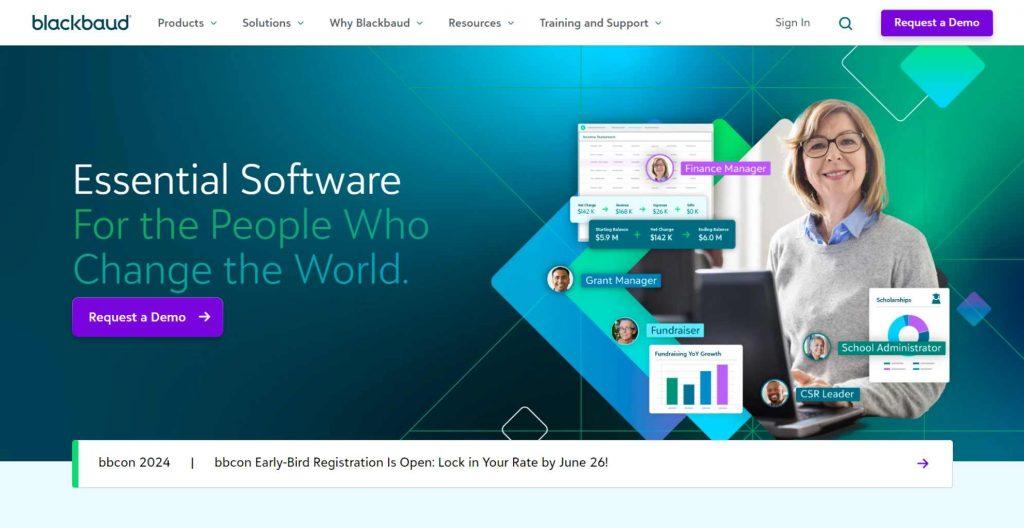
Blackbaud’s advanced event management capabilities streamline event planning, execution, and analysis, ensuring successful and impactful engagements. It integrates seamlessly with other essential tools, providing a unified approach to managing donor relationships and fundraising activities.
Pros of Blackbaud
- Industry Leader: Blackbaud is a well-established name in nonprofit software, offering a comprehensive suite of tools.
- Advanced Features: The platform provides advanced fundraising, financial management, and analytics capabilities.
- Scalability: Blackbaud is highly scalable, catering to the needs of both small and large organizations.
Cons of Blackbaud
- Cost: Blackbaud’s advanced features come at a premium price, which can be prohibitive for smaller nonprofits.
- Learning Curve: The platform can be complex, requiring significant time to master.
Pricing for NPO
Blackbaud offers various pricing plans tailored to nonprofit organization’s size and requirements. Contact the sales team for detailed pricing information.
6. DonorDirect
Suitable for: DonorDirect is ideal for faith-based nonprofits looking for specialized tools that integrate seamlessly with their existing systems and processes.
DonorDirect is a versatile online fundraising platform, making it a compelling alternative to Bonterra for non-profit organizations. Its robust features support fundraising strategies, from traditional campaigns to digital and peer-to-peer initiatives.
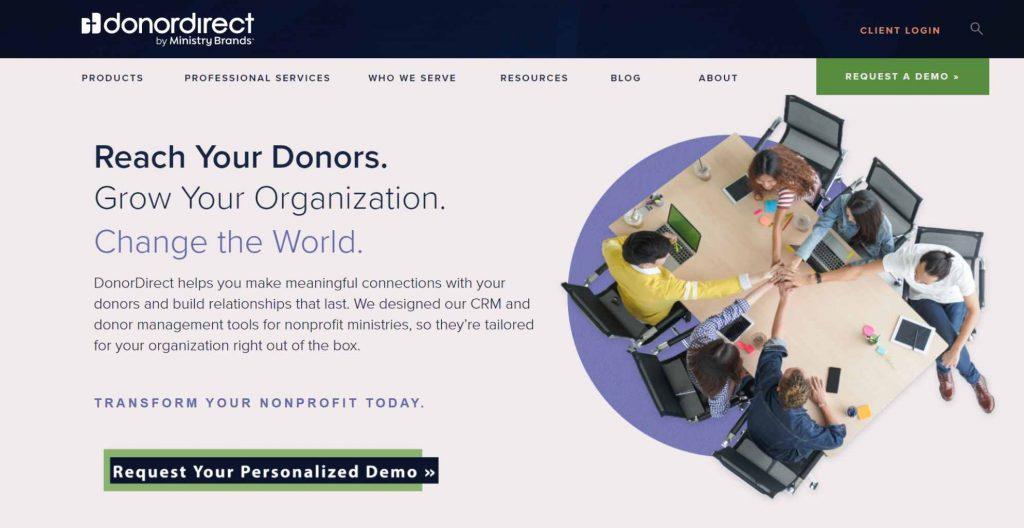
The platform’s user-friendly interface and customizable options ensure that non-profits can tailor their approach to meet specific needs, improving overall efficiency and engagement.
Pros of DonorDirect
- Specialized for Faith-Based Organizations: DonorDirect is particularly tailored for faith-based nonprofits, offering tools that meet their unique needs.
- Integration: The platform integrates well with other church management and financial software.
- Customization: A high degree of customization is available to match specific organizational workflows.
Cons of DonorDirect
- Niche Market: Its specialization may be less suitable for secular nonprofits.
Pricing for NPOs
Pricing is customized based on the organization’s size and needs. DonorDirect offers personalized quotes and potential discounts for faith-based organizations.
7. CharityEngine
Suitable for: CharityEngine is suitable for medium—to large nonprofits looking for an all-in-one platform that combines fundraising, marketing, and strong data security.
For non-profit organizations seeking migration from Bonterra to other CRM platforms, CharityEngine offers a user-friendly solution. This platform integrates CRM, online fundraising, and donor management into one seamless system.
With features like automated workflows, real-time analytics, and customizable forms, CharityEngine simplifies complex tasks and helps organizations focus more on their mission.
Pros of CharityEngine
- All-in-One Solution: CharityEngine provides a comprehensive suite of tools for fundraising, marketing, and other services.
- Automation: Features robust automation capabilities, reducing administrative burdens.
- Data Security: Strong focus on data security and compliance with industry standards.
Cons of CharityEngine
- Complexity: The platform can be complex and may require dedicated staff training.
- Pricing: Higher cost than competitors, which might concern smaller organizations.
Pricing for NPOs:
CharityEngine offers tiered pricing plans with discounts for nonprofits. Detailed pricing, tailored to the organization’s size and needs, is available upon request.
Pricing Plans:
- Basic: $299
- Starter: $549
- Pro: Contact team
Get More Done with Less Effort
Our experts help you maximize productivity and streamline workflows with ease.
FAQ
1. What should I look for in a Bonterra alternative?
When searching for a Bonterra alternative, consider factors such as ease of use, customization capabilities, scalability, integration with existing tools, cost, and customer support. Choosing a platform that aligns with your nonprofit’s specific needs and long-term goals is crucial.
2. How does Monday.com compare to Bonterra for nonprofit use?
monday.com offers a highly adaptable and user-friendly interface, which can be a significant advantage for nonprofits transitioning from Bonterra. It provides customizable workflows, robust collaboration tools, and seamless integrations with other software, making managing donor relationships easier and streamlining operations.
3. Are there any special pricing options for nonprofits when choosing a new CRM?
Yes, many CRM platforms offer special pricing or discounts for nonprofit organizations. For instance, monday.com provides discounted plans for nonprofits, helping them manage costs while accessing comprehensive project management and collaboration tools.
4. What are the key benefits of using a CRM like monday.com for nonprofit organizations?
Using a CRM like monday.com can offer several benefits, including:
- Customizable workflows: Tailor the platform to fit your specific operational needs.
- User-friendly interface: Simplifies navigation and use for all team members.
- Enhanced collaboration: Integrates messaging, file sharing, and real-time updates to improve teamwork.
- Scalability: Grows with your organization as your needs evolve.
- Seamless integrations: Connects with other essential tools to streamline operations and data management.
Which is the Best Bonterra Guided Fundraising Alternatives
From the user-friendly interface of monday.com to the specialized tools of DonorDirect, each platform provides unique advantages that can help nonprofits enhance their operations and achieve their missions more effectively.
Among these options, monday.com stands out for its adaptability and ease of use, making it a strong contender for organizations seeking a smooth transition from Bonterra. Its customizable workflows, robust collaboration tools, and seamless integrations allow nonprofits to manage their donor relationships and projects efficiently.
Ultimately, the best choice will depend on your organization’s specific needs and goals. By exploring the features and benefits of each alternative, you can find the perfect solution to continue your nonprofit’s important work without interruption.
Explore how Monday.com can support your nonprofit’s mission and discover the potential of a more intuitive, customizable, and collaborative platform.
Don’t Navigate This Complex Transition Alone!
Editor's Choice

Smartsheet Alternatives: Discover Smarter Project Management Tools
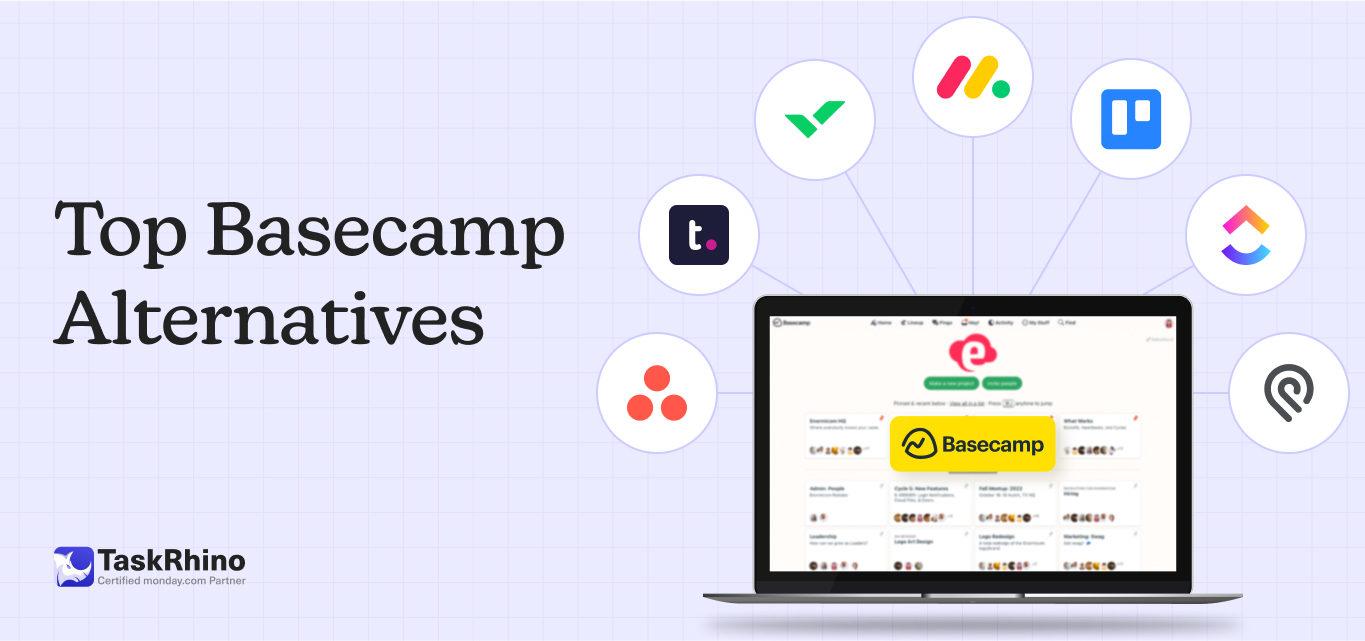
Top 10 Basecamp Alternatives for Better Project Management
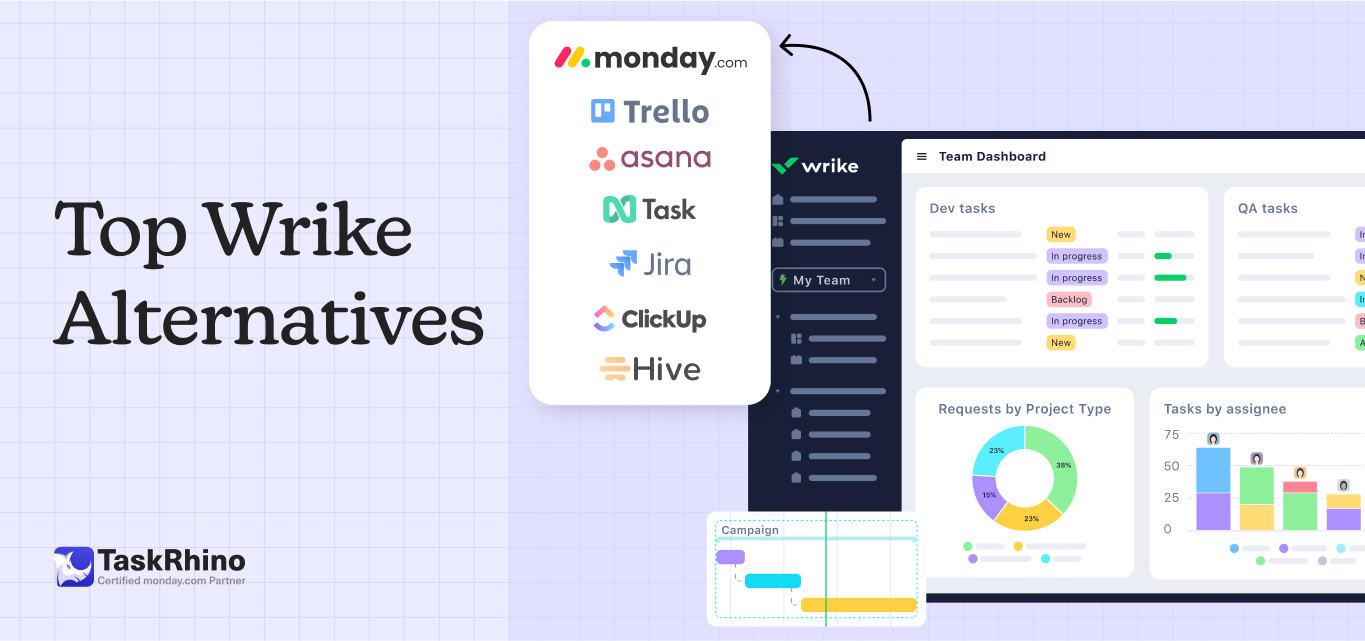
Wrike Alternatives: Top Project Management Tools to Consider
